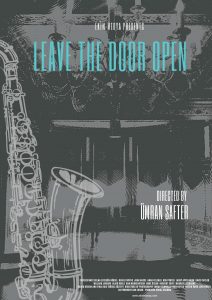SIYAH: The Sultans of Jazz: Part II
A Reappraisal of the Turkish Influence on African-American Music
Adama Juldeh Munu speaks to filmmaker Ümran Safter over her new feature-length documentary on the Ertegün Brothers, who left an indelible imprint on African-American music and culture. Audiences will learn how they helped to desegregate music during the Jim Crow era in the United States. This is the eleventh instalment in ‘Siyah’, which explores the relationship between African Diaspora and Turkish social and cultural narratives.
Adama Juldeh Munu: Can you explain the title of the documentary?
Ümran Safter: We opted to name the film ‘Leave The Door Open’. We chose ‘Leave The Door Open’ because of an experience Nesuhi Ertegün recalls in an interview he gave to the Washington Post. He had some friends over for a jam session at the Turkish Embassy residence. His father, the ambassador, was holding a formal event at the residence at the same time and Nesuhi feared being told off for making too much noise. The reaction he received instead was unexpected – something you will see in the film.
I also think ‘Leave The Door Open’ in a way reflects Turkey’s current open-door policy towards refugees. It is through this policy that Turkey extends a helping hand to millions of refugees and migrants. The position of the Turkish ambassador in Washington all those years ago shows that such a welcoming nature is part of a deeper-rooted cultural trait. The Turkish Embassy, by opening its doors to African-American musicians during that period, had smashed a massive race barrier by embracing the unifying power of jazz.
AJM: The story of the Ertegün brothers is well known within African-American music history. What drew you to tell their story through the documentary format?
ÜS: I read an article in an American publication a few years ago about the Ertegün brothers and was fascinated by their story. I started researching the topic in detail. It was a massive thing that the Ertegün brothers did in that period and the conditions that existed back then. It was practically unheard of that Black and white musicians could perform together to mixed audiences in the America of the 1930s and 1940s, due to the levels of racism. And the two people who took this courageous step were the two young sons of the Turkish ambassador to Washington DC. I felt a feature-length documentary detailing various aspects of this incredible story would do it justice.
AJM: The story of how their father invited Black musicians to the US Embassy was a bold move. Where did you think their determination to cross colour lines came from?
ÜS: Ambassador Mehmet Münir Ertegün was an educated diplomat who was raised in a multicultural Istanbul. His children also grew up in very multicultural settings in various parts of the world, owing to their father’s work. Racial discrimination was totally unacceptable for Ambassador Mehmet Munir Ertegün and his family. In the film, the ambassador’s daughter, Selma Ertegün Göksel, recalls an incident where white staff at the Turkish Embassy in Washington told the ambassador they would not sit at the same table with Black staff for meals and wanted segregated seating. The ambassador rejected their demand without hesitation. This incident led to Nesuhi and Ahmet being more comfortable with inviting African-American musicians to the residence.
AJM: Is the Ertegün brothers’ proximity to ‘whiteness’ explored in the film, and how important do you think it was for them to be able to navigate the music industry?
ÜS: The defining aspect of the Ertegün brothers is that they were colour blind and their total love for jazz. The way they went about setting up and running Atlantic Records was a game-changer for the recording industry because they refused to view their artists as mere commodities to be profited from.
AJM: Historically, accusations have been labelled against the music industry for cultural appropriation of Black music and culture. Did the Ertegün brothers face these accusations?
ÜS: We have people in the film speaking about how the Ertegün brothers changed the music industry as well. For instance, here is one quote from the film: “They broke ground in the recording industry by doing the same things they did with the jam sessions informally in the embassy. They got the top performers but not just on a business level… they befriended them …they showed them respect, which wasn’t always happening in the recording industry.”
They did not look at these musicians as simply a commodity to be sold. They really respected them as artists and I think that was one of the reasons Atlantic Records became so powerful. It became one of the record labels that really focused on the art and really cared about doing the best that they could for the artists.
AJM: What do you think their overriding legacy is and how does the documentary convey this?
ÜS: I think the biggest legacy that Ahmet and Nesuhi leave is that they proved that prejudice of any kind has no way of succeeding in the face of the multicultural nature of music when people are willing to be courageous and stand up for what they believe in. There is no reason why we can’t make use of the universal and unifying nature of music, if two young brothers were able to defeat such entrenched prejudice back then. I also think the Ertegün brothers and their family, through their actions, strengthened both the US-Turkish cultural bond and created a deep-rooted friendship between Turkey and the African-American community.

Check out the rest of the ‘Siyah’ series here



